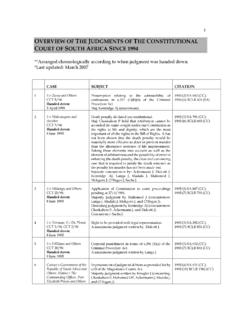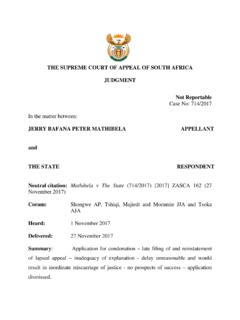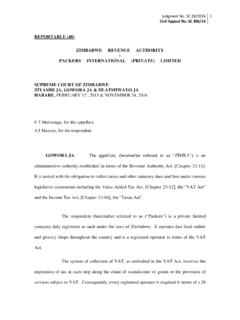Transcription of THE SUPREME COURT OF APPEAL OF SOUTH AFRICA
1 THE SUPREME COURT OF APPEAL OF SOUTH AFRICA reportable CASE NO: 373/06 In the matter between : THE STATE Appellant and ABRAM MABENA First Respondent (Accused 1 a quo) OUPA FRANS BOFU Second Respondent (Accused 2 a quo) _____ Before: HARMS, STREICHER & NUGENT JJA Heard: 19 SEPTEMBER 2006 Delivered: 17 OCTOBER 2006 Summary: Bail Schedule 6 offences bail not competent in absence of proper enquiry being made in terms of Criminal Procedure Act. Neutral citation: This judgment may be referred to as The State v Mabena [2006] SCA 132 (RSA) _____ REASONS FOR JUDGMENT _____ NUGENT JA 2 NUGENT JA: [1] The respondents, who stand accused of the commission of serious offences, were granted bail by a judge of the High COURT , Pretoria.
2 The prosecution appealed against the order with leave granted by this COURT . At the close of argument we upheld the APPEAL , set aside the order admitting the respondents to bail, ordered the Registrar of the High COURT to issue a warrant for the arrest of the respondents, and indicated that the reasons for our decision would follow. These are the reasons. [2] The Constitution proclaims the existence of a state that is founded on the rule of law. Under such a regime legitimate state authority exists only within the confines of the law, as it is embodied in the Constitution that created it, and the purported exercise of such authority other than in accordance with law is a nullity.
3 That is the cardinal tenet of the rule of law. It admits of no exception in relation to the judicial authority of the state. Far from conferring authority to disregard the law the Constitution is the imperative for justice to be done in accordance with law. As in the case of other state authority, the exercise of judicial authority otherwise than according to law is simply invalid. [3] The principles relating to bail, which are partly codified in chapter 9 of the Criminal Procedure Act 51 of 1977, were extensively considered by 3 the Constitutional COURT in S v Dlamini; S v Dladla; S v Joubert; S v Certain provisions of chapter 9 have been amended since that decision but they do not alter the principles that are relevant to the present case.
4 [4] The circumstances in which bail may be granted are provided for in s 60 of the Act. Some of the principles that are embodied in that section differ depending upon the gravity of the alleged offence. Generally an accused person who is in custody is entitled to be released on bail if the COURT is satisfied that the interests of justice so permit .2 Five grounds are listed upon which, if established, the interests of justice do not permit the release from detention of an accused .3 Two of those grounds concern the impact that the granting of bail might have upon the conduct of the particular The remaining three concern the impact that the granting of bail might have upon the administration of justice generally and upon the safety of the Then follows an extensive and detailed list of what were described 1 1999 (4) SA 623 (CC).
5 2 Section 60(1)(a). 3 Section 60(4). At the time Dlamini was decided that subsection provided that [t]he refusal of bail and the detention of an accused in custody shall be in the interests of justice where one or more of the following grounds are . 4 Where there is a likelihood that the accused, if released on bail, will attempt to evade his or her trial (para (b)), or will attempt to influence or intimidate witnesses or to conceal or destroy evidence (para (c)). 5 Where there is a likelihood that the accused, if released on bail, will endanger the safety of the public or any particular person or will commit a Schedule 1 offence (para (a)) or will undermine or jeopardize the objectives or the proper functioning of the criminal justice system, including the bail system (para d)), or where in exceptional circumstances there is the likelihood that the release of the accused will disturb the public order or undermine the public peace or security (para (e)).
6 4 in Dlamini as the potential factors for and against the grant of bail,6 to which a COURT must have regard in considering where the interests of justice That scheme for the granting or withholding of bail was held in Dlamini to be generally consistent with the constitutional right of an arrested person to be released from detention if the interests of justice permit. 8 [5] Graver offences (the offences listed in Schedules 5 and 6 of the Act) are subject to a more stringent regime. Only the regime that applies to Schedule 6 offences is relevant to this APPEAL . While an arrested person is generally entitled to be released on bail if a COURT is satisfied that the interests of justice so permit, the reverse applies where a person has been charged with a Schedule 6 offence.
7 In those cases a COURT is obliged to order that the accused be detained in custody until he or she is dealt with in accordance with law, unless the accused, having been given a reasonable opportunity to do so, adduces evidence which satisfies the COURT that exceptional circumstances exist which in the interests of justice permit his or her release. 9 That reversal of the general rule was held in Dlamini to limit the constitutional right to bail but the relevant provision (s 60(11)(a)) survived a declaration of invalidity because the limitation was held to be reasonable 6 The various factors are contained in ss 60(5) (9). 7 Dlamini, para 42, underlining added.
8 8 Section 35(1)(f) of the Constitution. While ss 60(4)(e) and (8A) of the Act were held to limit that right the limitation was held to be justifiable and reasonable and therefore valid (para 55). 9 Section 60(11)(a). 5 and justifiable in terms of s 36 of the Constitution in our current circumstances .10 [6] The potential factors for and against the grant of bail listed in the Act are no less relevant to the assessment of bail in relation to Schedule 6 offences than they are in relation to lesser offences. Before a COURT may grant bail to a person charged with such an offence it must be satisfied, upon an evaluation of all the factors that are ordinarily relevant to the grant or refusal of bail, that circumstances exist that warrant an exception being made to the general rule that the accused must remain in custody.
9 The effect of the subsection was described as follows in Dlamini (I have separated the sentences for emphasis):11 (a) The subsection says that for those awaiting trial on the offences listed in Schedule 6, the ordinary equitable test of the interests of justice determined according to the exemplary list of considerations set out in ss (4)-(9) has to be applied differently. (b) Under ss (11)(a) the lawgiver makes it quite plain that a formal onus rests on a detainee to satisfy the COURT . (c) Furthermore, unlike other applicants for bail, such detainees cannot put relevant factors before the COURT informally, nor can they rely on information produced by the prosecution; they actually have to adduce evidence.
10 10 Dlamini, para 77. 11 Para 61. 6 (d) In addition, the evaluation of such cases has the predetermined starting point that continued detention is the norm. (e) Finally, and crucially, such applicants for bail have to satisfy the COURT that exceptional circumstances exist. And further:12 [Section] 60(11)(a) does more than restate the ordinary principles of bail. It states that where an accused is charged with a Schedule 6 offence, the exercise to be undertaken by the judicial officer in determining whether bail should be granted is not the ordinary exercise established by ss 60(4)-(9) (and required by s 35(1)(f) [of the Constitution]) in which the interests of the accused in liberty are weighed against the factors that would suggest that bail be refused in the interests of society.








